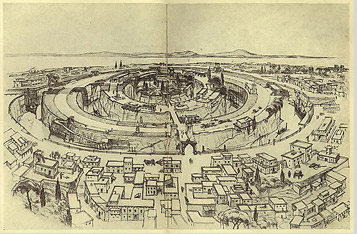
When I start a class on mythology, I find that I have to do two things right off: first of all, to persuade some in the audience who have a trivializing view of myth as representing falsehood. What people usually mean, when they speak, say, of The Myth of the Overpaid Football Coach, is referring in a debunking manner not to a myth at all, but to a stereotype or superficial conception of something they despise.
Secondly, I try to indicate that mythology is not just the province of the nursemaid-storytellers who agitated Platon—in matter of fact, he actually crafted a fair number of myths to use in his philosophical teaching (Catalin Partenie has usefully edited a volume that introduces ten of the major ones, including the Cave, the Winged Soul, the Androgyne, and the myth of Atlantis).

And I guess third, I emphasize the context of the mythological materials—any one of them represents the extremely complex background that makes up the socio-historico-cultural text that has resonances across the spectrum of our literary heritage. Obviously in myth studies, but also in textual studies—the realm of historical reconstruction and iconography. Then there are always gender and class aspects, and modeling of a society’s female or male hero—whether that of the classical hero, who gains a boon for the community, or the modern one, who in fact is mostly self-seeking.
And no analysis can afford to ignore the reflections from the specific original period: whether Ancient Near Eastern, or Greek, Roman, or biblical—myths are all most strongly intertextual, and influence one another. In these areas divine communications are often by dreams, which are featured so repeatedly in this myth; and the culture’s attitude toward the Divine Feminine is still strong—such themes could take us into another study.
Because of these and other factors (my inclusive definition in Mythography: The Study of Myths and Rituals has seventeen definitional attributes that I needed two chapters to explicate fully), my mythographic emphasis has long been upon approaching any myth from many different disciplines: literary, historical, religious, psychological, philosophical. What I call “escaping from elementary and secondary school” means understanding that important myths are almost always extraordinarily complex, and will warrant attention from any of these approaches. No important myth can be boiled down to a comic-book or myth-handbook synopsis.
Think for instance of Dante’s Commedia Divina; Goethe’s Faust; Augustine’s theological classics; the corpus of the dialogues reported by Sokrates; the works of Francis Bacon, Kant, Hegel, Marx, Heidegger and Freud, Voltaire and Rousseau. I’ve always been repelled by the slogan that all you really need to know could fit into a nutshell—I hope this presentation has provided evidence for my rejection of such a position, and that when you reach your seventieth year, you’ll conclude as I have: that the more you know, the more you realize you still have to learn.
William G. Doty, Ph.D., is Professor Emeritus of Humanities and Religious Studies at the University of Alabama. His best known books include Mythography: The Study of Myths and Rituals; Myths of Masculinity; and Myth: A Handbook. He is the former editor of Mythosphere: A Journal for Image, Myth and Symbol. More about William G Doty, Ph.D.
Works Cited or Recommended
Damrosch, David. 2007. The Buried Book: The Loss and Rediscovery of the Great Epic of Gilgamesh. New York: Holt.
Doty, William G. 1993. “Friendship at the Beginning: Gilgamesh and Enkidu.” Ch 4. of Myths of Masculinity. New York: Crossroad.
---. 2000. Mythography: The Study of Myths and Rituals. 2nd, revised ed. Tuscaloosa: U of Alabama P.
Ebert, John David. 2007. “How Gilgamesh Became the Lord of the Dead. Part One: Our Failure to Understand the Epic.” Mythic Passages: The Magazine of Imagination.
Foster, Benjamin R. trans. and ed. 2001. The Epic of Gilgamesh: A New Translation, Analogues, Criticism. A Norton Critical Edition. New York: Norton. With the Sumerian Gilgamesh Poems trans. by Douglas Frayne, and the Hittite Gilgamesh trans. by Gary Beckman. A brief selection of critical studies, featuring the very helpful literary-structural analysis of Thorkild Jacobsen.
Maier, John, ed. 1997. Gilgamesh: A Reader. Wauconda IL: Bolchazy-Carducci. A masterful collection of texts, critical essays, looks at the myth in later literature, and includes a bibliography of academic studies to 1994.
Mitchell, Stephen. 2004. Gilgamesh: A New English Version. New York: Free. Excellent extensive introduction; flowing, fluid translation-versification of the myth; many illuminating endnotes.
Partenie, Catalin, ed. 2004. Plato: Selected Myths. Oxford World’s Classics. New York: Oxford UP.







 Page
Page